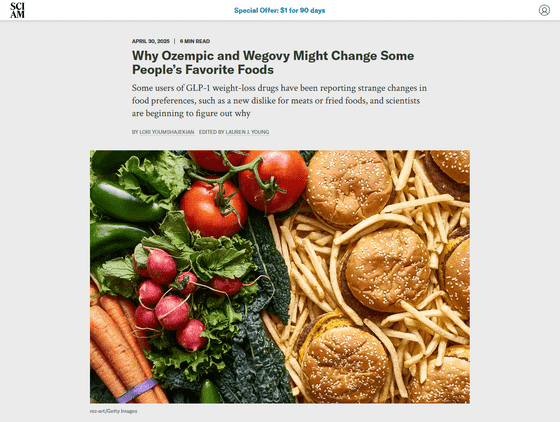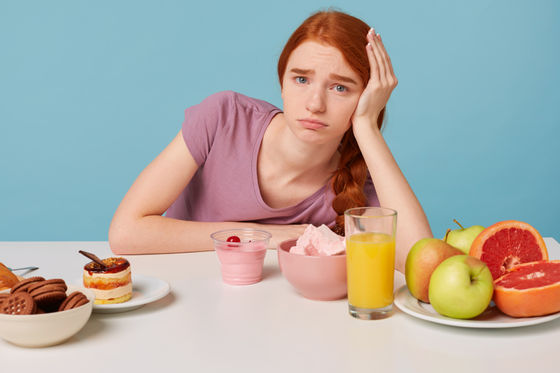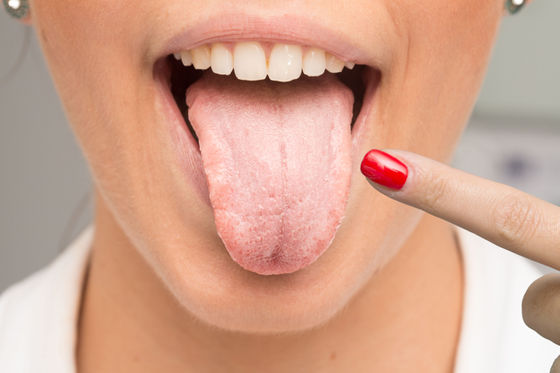Research is beginning to reveal why obesity drugs cause people to dislike meat and fried foods

The scientific journal Scientific American has compiled a list of experiences of people who have developed a dislike for meat, fried foods, and salty foods after taking
Why Ozempic and Wegovy Might Change Your Favorite Food | Scientific American
ttps://www.scientificamerican.com/article/why-ozempic-and-wegovy-might-change-your-favorite-food/

A former food reporter, Alyssa Fraser, who responded to an interview with Scientific American, said that she not only liked to eat but also to cook her own food, and that food was her hobby, but since she started using the popular weight loss drug Ugobi, her interest in food has waned. In particular, meat has begun to smell like a livestock barn, and even wine, which she used to like for its fruity aroma, has begun to smell grassy, Fraser says.
Fraser is not the only one to have experienced such changes. In online message board

Part of the reason GLP-1 agonists change food preferences lies in how they work: They mimic GLP-1, a hormone released when you eat food, and bind to GLP-1 receptors in brain areas involved in appetite regulation and reward pathways that suppress the pleasure response to food. Researchers have found that this is the primary mechanism by which GLP-1 agonists cause weight loss, and some suggest it may also explain the changes in food preferences.
For example, a 2017
These findings suggest that cravings for certain foods may change depending on whether you're hungry or full. 'When you're hungry, you're more likely to crave meat, high-protein or high-fat foods over sweets, but when you're full, the opposite happens,' said Brandell.
But some people are experiencing experiences that can't be explained by a feeling of fullness alone. Siobhan, a writer who asked us to withhold some of her name for privacy reasons, says that since she started taking Ugobe, she still likes greasy foods like French fries, but instead can't eat the Thai curry pan naan she's enjoyed for 20 years. Sarah Strebby, who has been using Ugobe for two years, says that she can no longer eat eggs or broccoli, and like Siobhan, she no longer likes spicy food, so her family now complains that the food she cooks is too bland.

These ideas also suggest that GLP-1 receptor agonists may have a direct effect on taste, though the reasons for this are complex:
In addition, a small study presented at the Endocrine Society's 2024 annual meeting showed that women taking semaglutide had a more sensitive sense of taste than women taking a placebo, and brain scans showed increased activity in areas involved in processing sensory rewards when tasting sweet foods. These findings have led some researchers to propose that 'overweight people eat more because they have a poorer sense of taste, but when GLP-1 receptor agonists increase their sense of taste, this can lead to them disliking certain foods.'
On the other hand, a new paper published in the peer-reviewed scientific journal Physiology & Behavior in March 2025 showed that GLP-1 receptor agonists reduce all five basic tastes (sweet, sour, salty, bitter, and umami), and that the side effects of the drug, including nausea, are stronger in people with better taste and smell. In other words, there are conflicting research results about whether GLP-1 receptor agonists dull or sharpen taste.
'We suspect that GLP-1 receptors in taste buds may be involved in the change in taste perception, but we don't know for sure, so more research is needed,' said Richard L. Doughty of the University of Pennsylvania, one of the authors of the new study.

Novo Nordisk, the pharmaceutical company that makes Ugovi and Ozempic, did not respond to Scientific American's request for comment. And a spokesperson for Eli Lilly, which developed tirzepatide and makes it under the brand name Zepbound, told Scientific American that 'we have no data available to share regarding changes in food taste or preference in people taking GLP-1 receptor agonists,' adding that anyone experiencing such side effects should talk to their healthcare provider.
While some people see the drug's effects on satiety and taste as a welcome change that helps prevent overeating, others have mixed feelings. 'Not only do I no longer cook, I'm also not as interested in food,' Fraser says. 'The only thing I crave is something sweet, and then I'll have a bite or two and then I'll give up. But it's been worth it for me, as it has greatly reduced the mental burden of losing weight.'